When Kingdom Come: Deliverance was released in 2018, I called it the most immersive experience I had ever had in a game. It had its fair share of flaws, but the fact remained: it felt like stepping into a time machine and traveling back to the Middle Ages.
Its sequel, Kingdom Come: Deliverance 2, follows the same formula—and now, I have a new most immersive experience. But does it still have its fair share of issues, or has developer Warhorse Studios made enough improvements that this time, it rightfully claims its throne among gaming’s royalty?
This review includes a small spoiler for an early side quest, but no other spoilers for part 2. It does contain spoilers for part 1, so if you haven’t played it and want to start from the beginning, consider yourself warned.
Hey, Henry’s Come to See Us Again, and It’s as if He Never Left
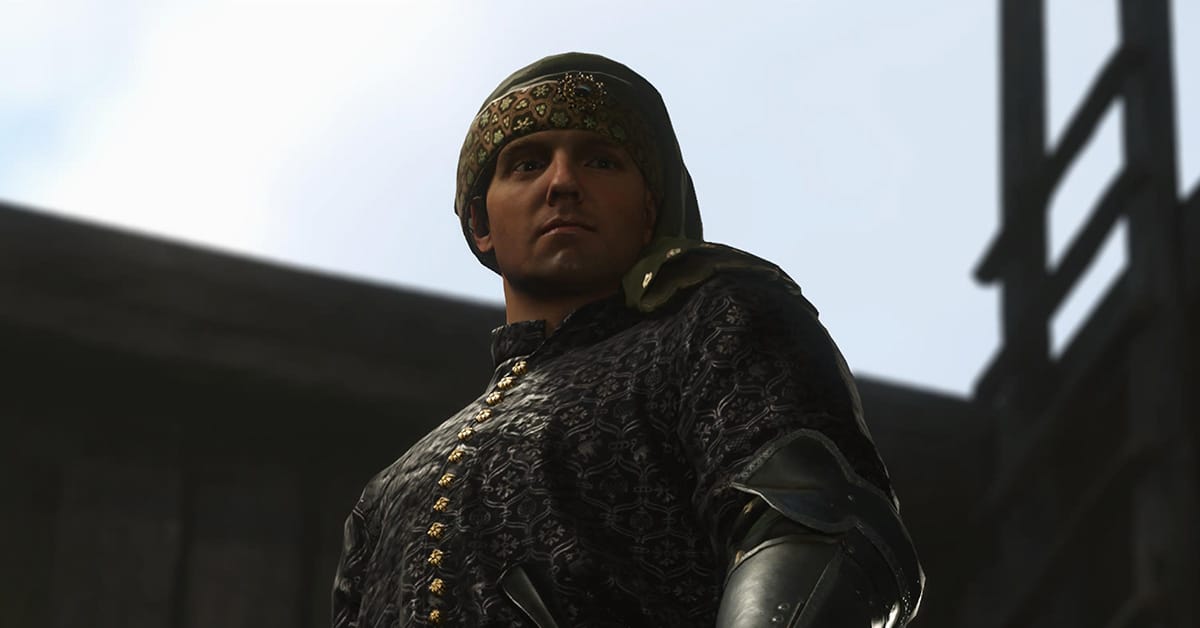
You are Henry, the son of a blacksmith. No demigod, no superspy, no street fighter; just an ordinary guy of humble origins. (Which, of course, only adds to the immersion, because I’m just a regular fool myself.)
The first-person action RPG picks up right where the first game left off. Until the events of the original game, Henry led a relatively peaceful life, until King Sigismund of Hungary invaded his homeland. Under Sigismund’s orders, Henry’s village, Skalitz, was brutally raided, and he watched helplessly as his parents were murdered before his eyes.
From that moment on, Henry becomes entangled in political intrigue, fighting for the rightful king, Wenceslas, while seeking vengeance on the men responsible for his parents’ deaths. But that journey is no swift endeavor, and this second game continues to explore both of these driving forces. That means you can large-scale battles, deadly sword fights—but more importantly: the experience of an ordinary, everyday medieval life. Because that is where, for me, the true magic of this game lies.
Regular Medieval Dude Simulator
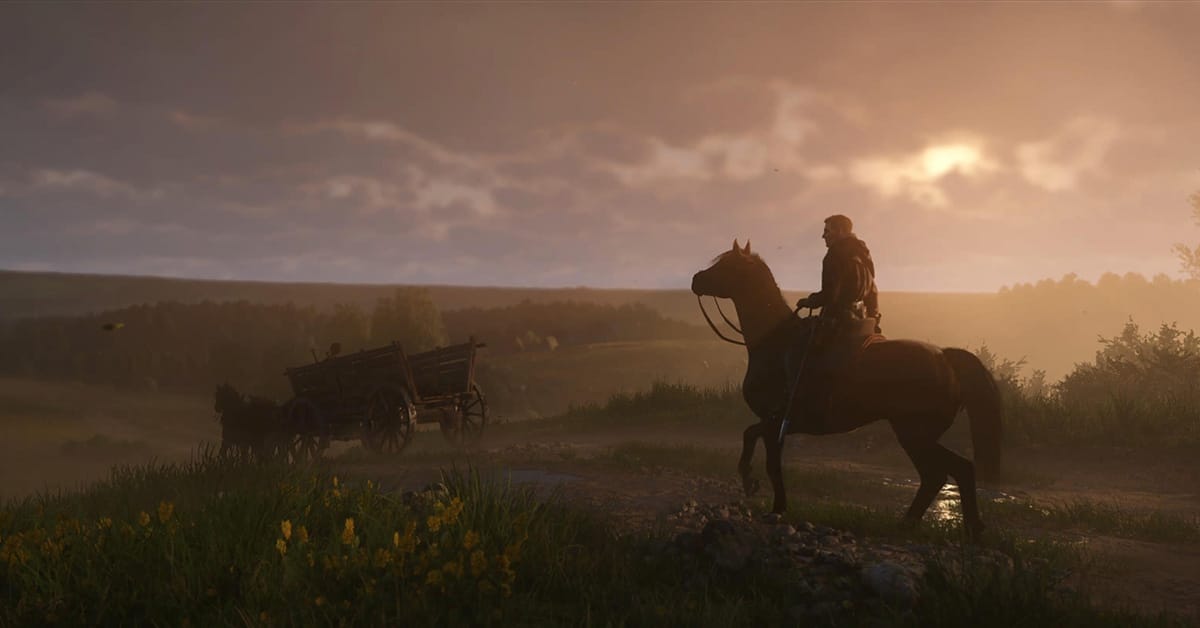
We all play games for different reasons. Some crave fast-paced action, others want to challenge themselves by breaking records or collecting trophies, while others seek complete immersion in the world and its characters. I firmly belong to the latter group, which is why Kingdom Come: Deliverance 2 perfectly suits my preferences.
I spent dozens of hours roaming around as Henry, never feeling rushed to follow quest markers. Instead, I asked myself: How would I actually spend a day here? And I can tell you—it was the kind of life I wouldn’t mind signing up for.
This game includes several status meters that contribute to the feeling of truly living in its world, including energy and hunger. As a result, I usually made sure to get to bed at a reasonable hour to recharge (unless I had plans for a bit of nighttime thievery), wake up with a decent breakfast, and keep my stomach satisfied throughout the day. Hunger and fatigue mechanics can often be annoying in games, but here, they never felt intrusive. Meters deplete at a natural pace, and there are plenty of ways to refill them.
At the start of the journey, money is tight, so my average day looked something like this: I’d wake up, grab a bite to eat, open the door and actually close it behind me (am I the only one who did this?). I’d wash my face in the nearby water trough to boost my charisma points. Then, I’d spend a few hours in the blacksmith’s forge, crafting weapons and selling them for a small profit—after a hard-fought negotiation with a stingy buyer.
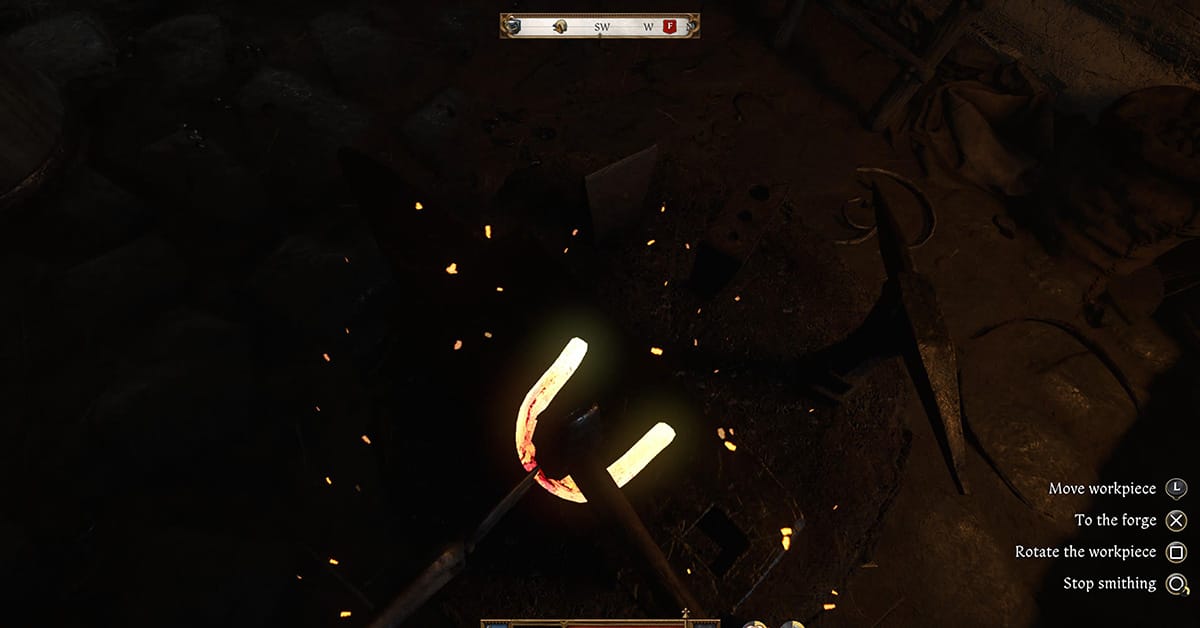
After that, I’d stroll into town and chat with the locals. The innkeeper would share bits of gossip and stories about the area, which my map would automatically record for future reference—unlocking new quests over time. And since I was already at the tavern, I could never resist the sunlit table with the gameboard on top of it. Feeling lucky, I’d bet my hard-earned Groschen on a simple yet addictively fun dice game.
Satisfied with my winnings, or sulking over my losses, I’d make my way back to the kind souls offering me shelter. I’d scoop another portion from the communal pot, since Henry was once again “feeling quite hungry,” then retreat to my room. There, I’d spend a few hours reading, improving my skills in the corresponding subject, before finally shutting my eyes.
A slow, peaceful, sunny day, but maybe tomorrow, I should finally tackle one of the many side quests waiting for me. Then again… maybe not. We’ll see.
The Best Side Quests I’ve Seen Since the Witcher 3: Wild Hunt
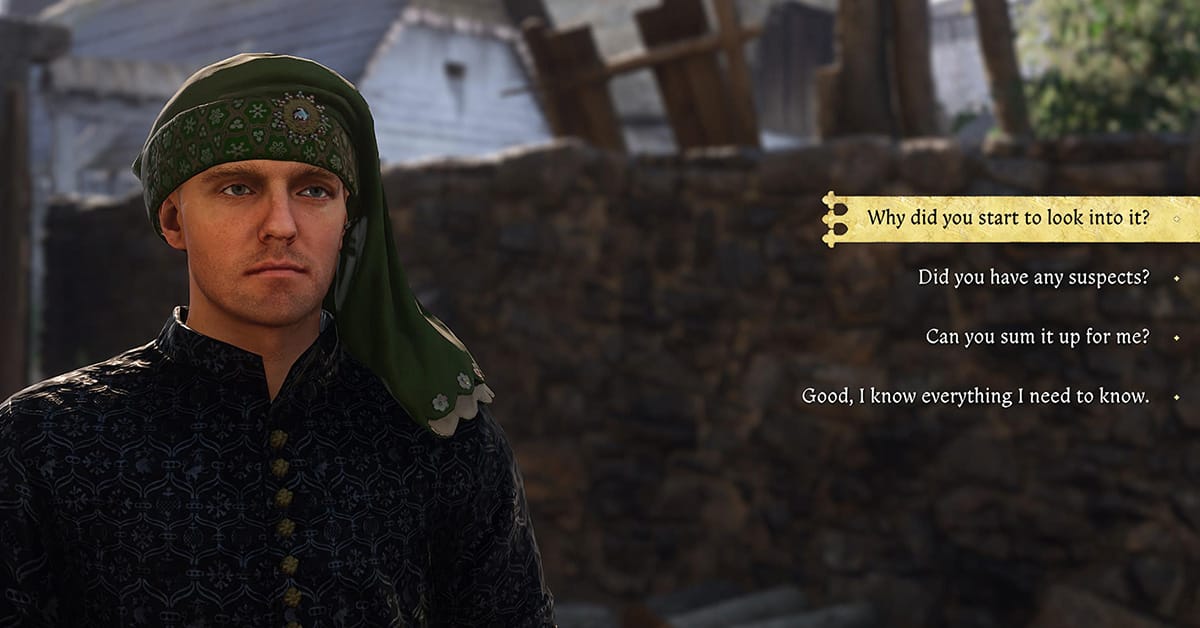
Living an ordinary life isn’t the only thing that’s worth it in Kingdom Come: Deliverance 2. The side quests in the game are of an incredibly high caliber. It’s rare for side quests to rival the main quests, but this is one of those unique cases. The quality of the writing in the side quests is on par with that of the main story. Technically, they’re just as well-crafted, too.
You can approach nearly every quest in multiple ways, each with its own unique outcome. A common flaw in many games is the illusion of choice—where decisions appear to matter, but the outcomes only differ on a superficial level. By replaying several quests and trying different approaches, I quickly realized that there’s no such thing as illusion in Kingdom Come: Deliverance 2: things can actually play out in completely different ways.
For example, you can typically choose between a “deeds over words” approach or a more peaceful route. By reading books, you can improve your scholarship, by engaging in numerous dialogues, you enhance your speech skills; and by dressing elegantly, you can come across as noble. All these factors, and many more, influence how you can resolve conflicts. You can either use your fists to settle matters, or silence someone with your intellectual prowess, convincing them to abandon their ideas without any bloodshed.
“The freedom Warhorse Studios gives you throughout the entire game is clearly reflected in the quests. Do you help your employer, or do you find a better alternative that suits your wallet? The game breathes freedom on every level, and the replay value is immense.”
One example that really impressed me involved a quest where I could choose to drive out an enemy group from a village, and even kill them. The alternative, however, was to side with the enemy group. The violent outcome played out as expected, but the peaceful approach turned out to be much more entertaining. I received an invitation to visit the enemy encampment, leading to a night of stories, political differences, and a LOT of drinking. And you definitely don’t want to miss a chance for a drunken Henry, because that’s when he truly shines. Tom McKay’s performance is exceptional, but when he brings drunken Henry to life, all you’ll want is a night out at the tavern with the man himself.
This is just one of many examples. The freedom Warhorse Studios gives you throughout the entire game is clearly reflected in the quests. Do you help your employer, or do you find a better alternative that suits your wallet? The game breathes freedom on every level, and the replay value is immense.
The Way Your Skills and Experience Develop and Come Into Play Forms a Perfect Harmony
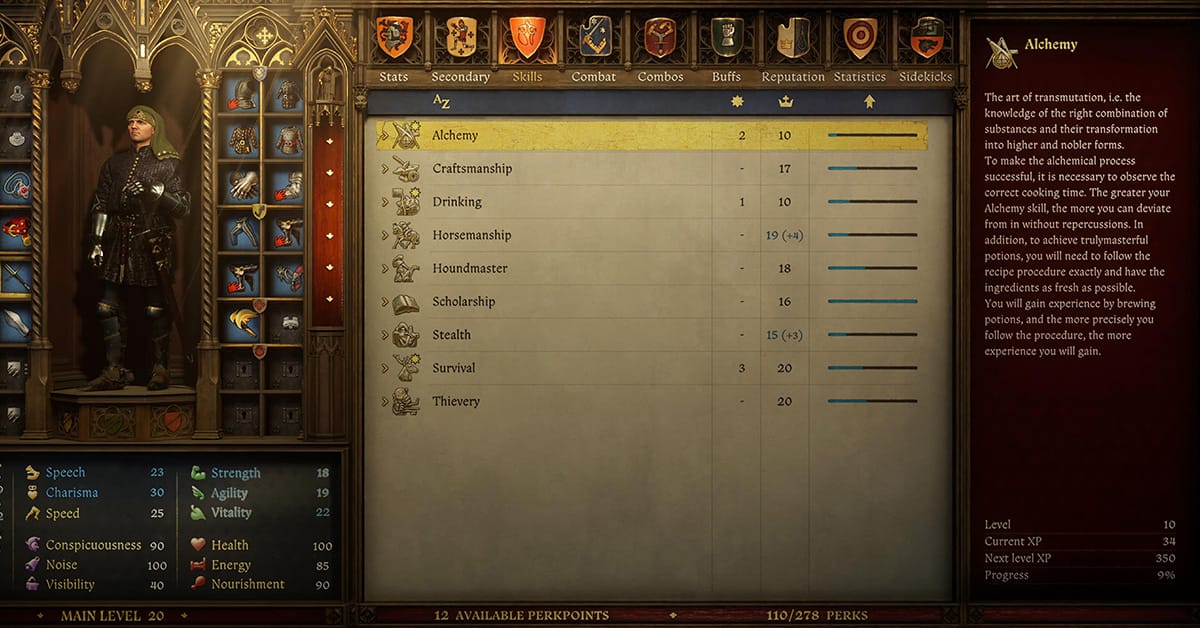
One of the many things I appreciate is how naturally progression happens. As I mentioned earlier, you can gain experience by reading books, but that’s just one of many ways.
Literally everything you do brings you closer to leveling up one of Henry’s many attributes. If you walk, you automatically work on your vitality. If you talk, you improve your speech. If you pet your dog or ride your horse, you level up your Houndmaster and Horsemanship skills. Sneak around, and you get better at Stealth. And the more locks you pick, the better you get at lockpicking. I could go on and on.
When one of those skills reaches a certain level, you gain a perk point that you can use in that category. These perks can include things like the ability to go longer before Henry starts to feel quite hungry, your clothes staying clean longer (because yes, that’s also a thing), or the ability to carry more weight.
Many of these skills also come in handy during quests. If you’ve developed your scholarship, you’ll be better at treating wounds. If you’ve had enough alcoholic beverages to level up your Drinking skill, you might impress that important wine connoisseur just a little faster.
During conversations, you’re presented with possible responses. Some are standard, while others are based on your skills. If you choose a response tied to one of your abilities, a skill check happens. If your skill is high enough, you can convince the other person to see things your way. If not, you’ll get a “check failed” message and will have to find another way to handle the situation.
Another perk is that you can see the difficulty of a skill check beforehand, which is incredibly useful before you try to act clever only to fail miserably.
When that happens, it affects your reputation. Both towns and individual people form opinions about you and your actions, which are influenced by the choices you make during quests and the dialogues you engage in. A good reputation, for example, can help you get lower prices or convince a guard who caught you stealing to turn a blind eye.
Fighting, Sneaking, and That Damn Dog
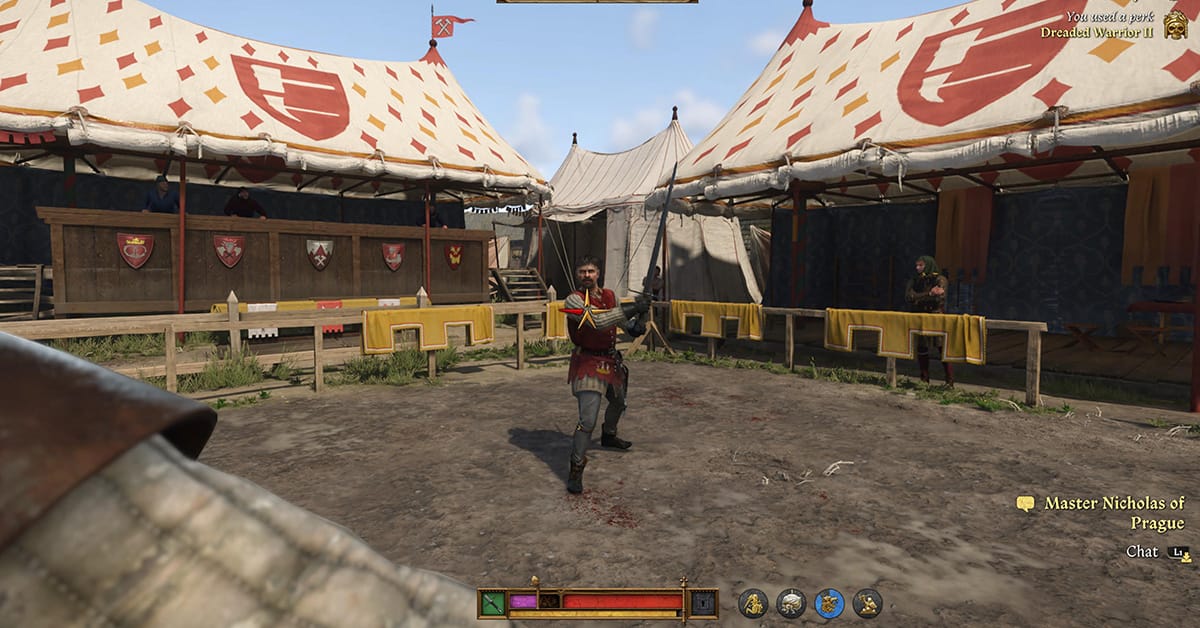
If you’d rather get your hands bloody than rely on your silver tongue, you’ll have to deal with combat which, unfortunately, still closely resembles that of the first game. It’s serviceable; nothing more, nothing less. I was never frustrated or bored by it, but it didn’t exactly thrill me either.
You can attack from four different directions. Combos are executed by chaining specific directional inputs, and you can parry and counter incoming strikes. These mechanics apply to various weapons as well as unarmed combat. Then there’s the bow and crossbow, which are all about aiming and shooting. This is easier said than done, since there’s no aiming reticle, and Henry loads each arrow painstakingly slowly. Like everything else in Kingdom Come, combat leans heavily into realism, which means you shouldn’t expect the fast-paced dynamism you might be used to from action-heavy games.
As you progress, you’ll encounter veteran soldiers who, for the right price, can teach you advanced combos and improve your proficiency with specific weapon types. Personally, I rarely bothered with combos—I mostly just hacked away blindly and focused on countering. So maybe I’m not the best judge here.
Some fights are unavoidable, but at times you have the option to take the assassin’s route instead. Normally, I’m not a huge fan of stealth, but in Kingdom Come: Deliverance 2, it feels incredibly satisfying. Enemy camps are understaffed at night, with most of the soldiers fast asleep. During one quest, I stalked and eliminated the remaining guards one by one before dealing with the sleeping ones. My Henry was usually a diplomat, but sometimes… he let out his inner psychopath.
“The damn dog annoyed me far more often than he ever actually helped. Kingdom Come is filled with despicable antagonists, but none quite as frustrating as Mutt.”
Just be sure to leave your dog, Mutt, behind. The little menace has a habit of ruining stealth missions with his barking. I can assure you that in my second playthrough, I won’t be searching for him. The damn dog annoyed me far more often than he ever actually helped. Kingdom Come is filled with despicable antagonists, but none quite as frustrating as Mutt.
Besides not bringing Mutt when you’re sneaking around at night, it’s also wise to dress accordingly. Your inventory includes meters that indicate how conspicuous your outfit is and how much noise you make while moving around in it. So maybe leave the full plate armor at home when you’re planning a break-in.
If You’re Like Me, You’ll Spend a Lot of Time Managing Your Gear
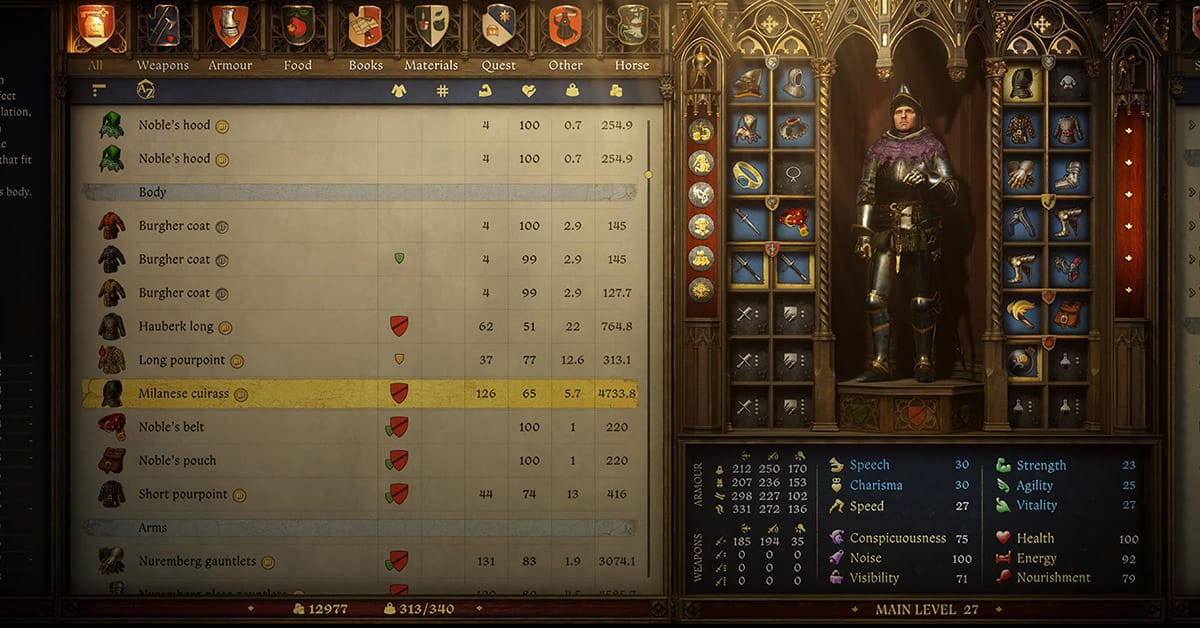
Dressing for the occasion is key. The game provides three outfit slots, allowing you to switch between different sets depending on the situation. I had one outfit optimized for maximum protection when I expected a fight, another reserved for social encounters to boost my charisma, and a lightweight, inconspicuous outfit for the nighttime heists I planned.
This isn’t just a matter of picking a shirt, pants, and boots. The game features a layered clothing system, meaning you can wear padded trousers under metal leg armor, a coif under your helmet, or a brocade over your armor. Every piece of clothing affects your protection, charisma, visibility, and the noise you make.
Your outfit also gets dirty from mud and blood and deteriorates over time, lowering its stats. A good bath, some laundry, or proper repairs will restore it to peak condition.
That’s quite a bit to keep track of! That’s why I wasn’t too happy when the game occasionally forced me out of my clothes (I swear, I’m innocent), making me manually re-equip all those layers again. But hey, that’s just a minor gripe.
Kingdom Come: Deliverance 2 Is Incredibly Smart, and It Expects You to Be Too
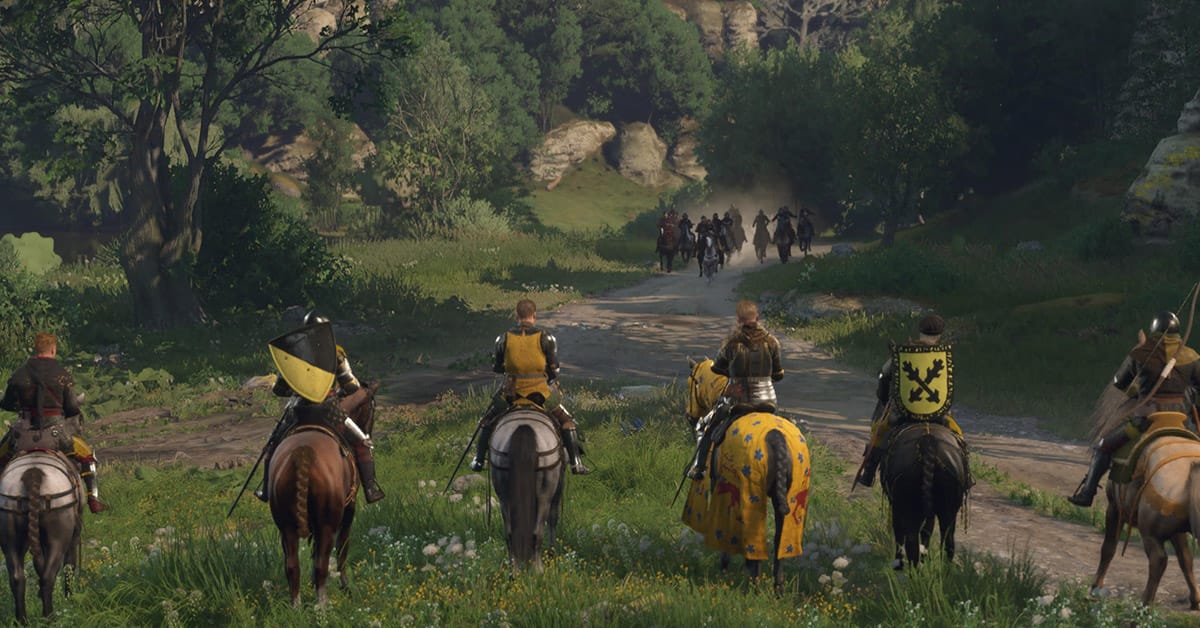
This review is getting a little out of hand, but there’s just so much to say about this massive game. We’re almost there, I promise—but first, I have to talk about how the developers constantly impressed me with the sheer intelligence of their masterpiece.
One of the best examples of this is the game’s crime system. As I mentioned earlier, my Henry was a bit of a wolf in sheep’s clothing. By day, he’d charm the townsfolk with his silver tongue, but by night, he was robbing those same people blind.
Naturally, stealing comes with risks. If you’re too reckless, shopkeepers might hear or see you, triggering an investigation—indicated by an icon at the top of your screen. If they catch you in the act, several things can happen. Some might simply tell you to get out, others will call for the guards, and a few might confront you directly, giving you a chance to talk your way out of trouble.
Even if you’re kicked out, don’t assume you’re in the clear. Many NPCs will check their inventory after you leave, and if something’s missing, they’ll be smart enough to connect the dots. It sounds obvious when written out, but very few games apply logic this well.
“Kingdom Come: Deliverance 2 raises the bar for RPGs, something that became painfully clear when I booted up another RPG afterward.”
And even if you do pull off the perfect robbery with no witnesses, you still need to be careful. I once left an armorer with barely a thing to sell, making off with most of his expensive gear. A few days later, I was proudly strutting through town in my new, shiny armor—only to run into the very same armorer, who recognized his stuff. He immediately called over a guard, and I was hit with a hefty fine.
Details like these make NPCs feel alive. They go about their day, working to make a living, rarely standing still. Kingdom Come: Deliverance 2 raises the bar for RPGs, something that became painfully clear when I booted up another RPG afterward. Suddenly, it was glaringly obvious that NPCs hadn’t moved an inch since I last spoke to them.
But it’s not just the game that’s smart; it expects you to be smart as well. Quest markers guide you through the story, so there is plenty of handholding, but the game still rewards curiosity. More than once, I found myself speaking to a quest giver’s spouse or associate, even though the game never explicitly told me to. Doing so often revealed new insights and sometimes even unlocked extra, optional objectives.
Minor Flaws Are Just That
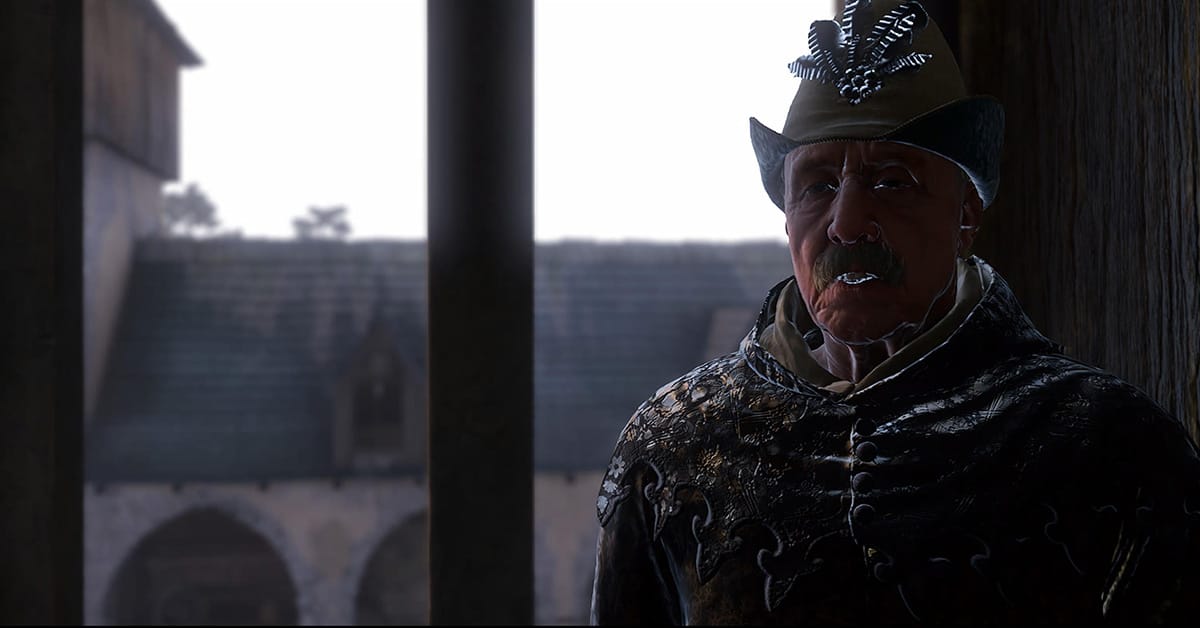
A game of this scale, packed with countless quests and an array of ways to approach them, is often riddled with bugs at launch. Fortunately, Kingdom Come: Deliverance 2 fares remarkably well in this regard. The most significant issue I encountered was a relatively unimportant sub-objective in a quest in which I was supposed to save a sick man but couldn’t because the option to give him a potion (one I definitely had) never appeared. A bit of a shame, but I wasn’t losing sleep over it. And, well, neither will he anymore.
The frame rate remains mostly stable throughout. Only toward the final stretch, when a lot is happening at once, did I experience occasional minor stutters. There are also the usual odd animations here and there, like NPCs pacing in tiny circles for no apparent reason. At one point, I was deep in conversation with a quest giver when, completely unscripted, a bandit randomly showed up and started pummeling me—while Henry and his companions stood there unfazed. By the time the dialogue screen ended, my quest giver was dead, forcing me to reload my save to actually complete the quest.
Visually, the game is often breathtaking. The landscapes, in particular, are stunning. Character models, on the other hand, are a bit less impressive and frequently reused. Even some major characters don’t always have unique faces.
There are also occasional graphical glitches, especially when characters are positioned against bright backgrounds. Light sources can bleed awkwardly through their eyes or mouths, creating some eerie effects. These are the kinds of minor hiccups Warhorse Studios will likely patch in the coming months, but they’re trivial in the grand scheme of things. The sheer quality of the experience far outweighs these imperfections.
Conclusion
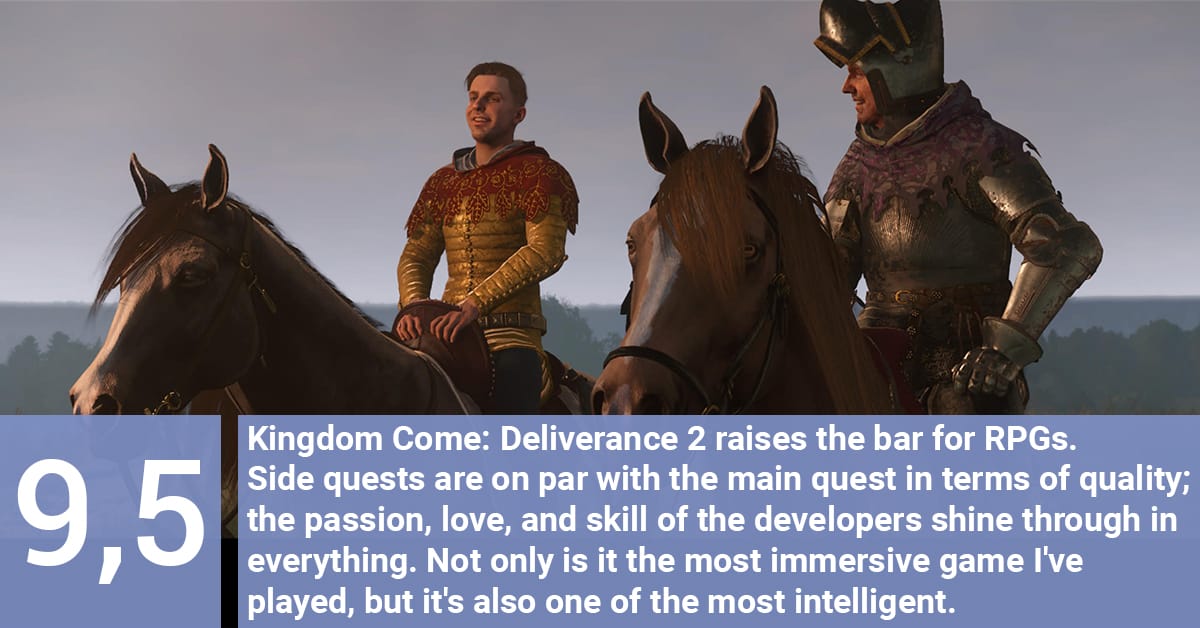
Kingdom Come: Deliverance 2 is so overwhelming in every aspect that it’s hard to sum up. But if I had to try, I would sum it up in one word: brilliant.
The side quests are on par with the main quest in terms of quality; the passion, love, and skill of the developers shine through in everything. Rarely have I played a game that offers so much freedom, that invites exploration so eagerly, and in which all the systems come together to create a fantastic gaming experience that everyone can approach in their own way.
Technical hiccups, a still somewhat uninteresting combat system, and an incredibly annoying dog are nothing more than tiny blemishes on an adventure I won’t forget anytime soon. I’m already looking forward to my second playthrough.
Kingdom Come: Deliverance 2 is the game to beat this year, and without a doubt, a strong contender for Game of the Year.







